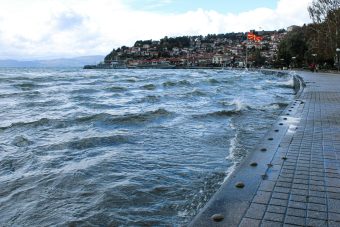North Macedonia has signed an agreement with the State Oil Company of the Republic of Azerbaijan (SOCAR) to enhance its energy security. The partnership, formalized through a Memorandum of Understanding on cooperation in the energy sector, focuses on diversifying natural gas supplies and exploring innovative energy project solutions such as gas cogeneration.

Fossil fuels, supplemented by limited hydropower, form the backbone of the country’s energy mix. Due to its heavy reliance on imported energy, North Macedonia has been significantly impacted by the energy crisis, making diversification of sources a logical next step. The majority of the natural gas consumed in the country comes from Russia, with a smaller share from Greece. This dependence on a single primary source, coupled with fluctuating energy prices, has repeatedly strained the energy sector.
SOCAR, with access to vast gas resources from the Caspian Sea region, not only manages extensive reserves but also operates key pipelines such as the Trans-Anatolian Natural Gas Pipeline (TANAP) and the Trans-Adriatic Pipeline (TAP), which connect directly to Europe. By joining forces with SOCAR, North Macedonia aims to achieve a more stable gas supply and better control over energy prices, although it is not the only country in the region sourcing gas from Azerbaijan.
More:
- From Azerbaijan, One Million Cubic Meters of Gas Per Day During This Winter
- Construction of the Gas Interconnection Between Serbia and North Macedonia
- German state approves gas drilling project in North Sea
Serbia, for instance, has also recently started importing gas from Azerbaijan. Last year, Srbijagas and SOCAR signed an agreement for the delivery of up to 400 million cubic meters of gas annually until 2026, with projections to increase these volumes to one billion cubic meters thereafter. Azerbaijani gas reaches Serbia through a new pipeline to Bulgaria, partially financed by the European Union (EU), which commenced trial operations in December 2023. This project also aimed to diversify Serbia’s sources, reducing its reliance on Russian gas given the high demand.
As for North Macedonia, its plan includes a €1 billion investment in a gas cogeneration system. This technology simultaneously produces electricity and heat from a single source—natural gas. It is an efficient method of energy utilization, as heat that would otherwise be wasted in conventional power plants is used for heating during the winter. By employing natural gas in a more efficient system like cogeneration, overall carbon dioxide emissions are reduced compared to less efficient systems.
From an economic standpoint, stable gas prices can lead to lower energy costs. However, the country must carefully transition to renewable energy. Despite the advantages of natural gas compared to some other energy sources, it is crucial for North Macedonia to increase its use of renewables to enhance economic competitiveness and reduce dependence on fossil fuels, which currently dominate the energy mix.
Milica Vučković

